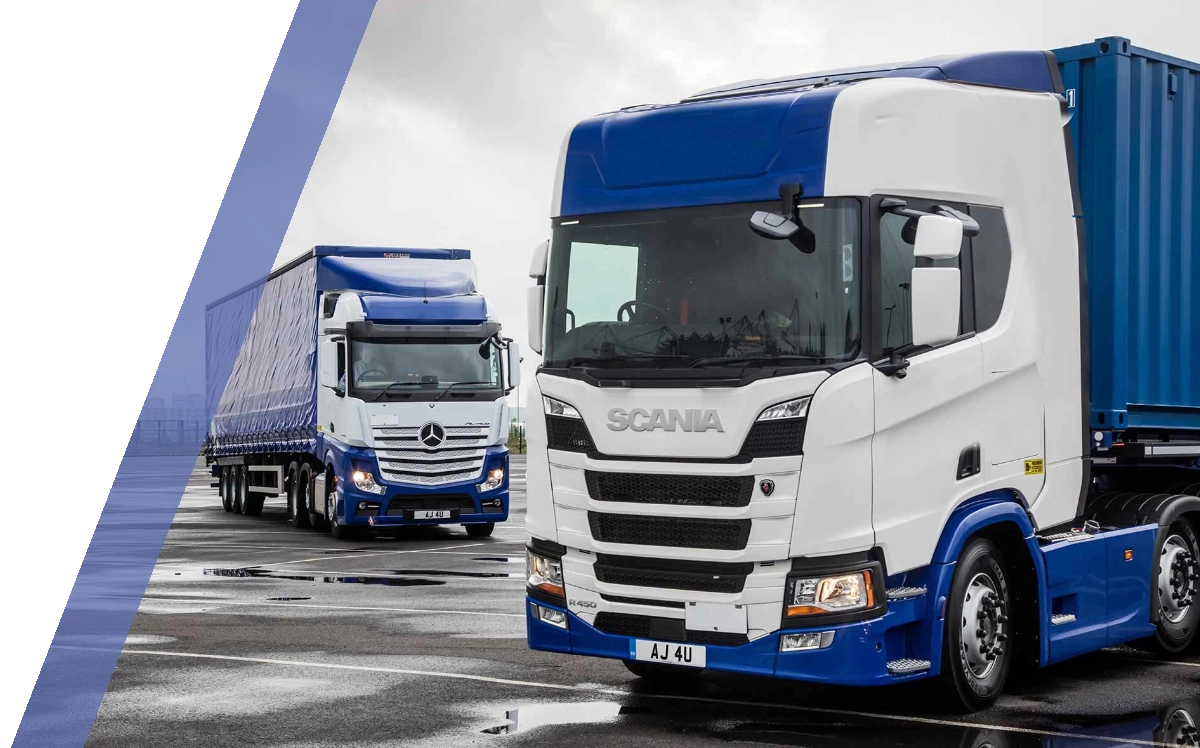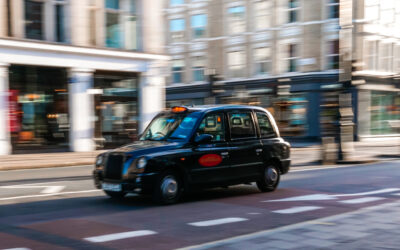Commercial Motor Insurance Facts
More information on different levels of cover and ratings factors

Commercial Motor & Fleet
Motor insurance is compulsory in the UK. The Road Traffic Act 1988 (as amended and updated by later legislation) makes it illegal to use a motor vehicle on a road, or public place, unless insurance is in force covering legal liability for injury to others and damage to their property. From May 2011, it also became illegal to keep a vehicle without appropriate insurance unless the DVLA has been notified that it is ‘off road’.
There are 4 levels of cover available:
- Road Traffic Act only
- Third party only
- Third party, fire and theft
- Comprehensive
There are two distinct types of policy that are common in the commercial vehicle insurance market:
- Fleet – this is where a number of vehicles owned by the same company are insured on a single policy. Fleet policies can consist of private cars, goods-carrying vehicles, other commercial vehicles or a mixture of different types.
- Non-fleet – this is the term used to describe policies which insure single or usually fewer than five vehicles
Rating Factors
There is greater individual underwriting of commercial motor risks compared to private motor, because of the huge variety of different categories of vehicles and their uses, together with the need to consider the individual claims experience for each risk. The strength of a Commercial Motor team in a broker, it’s relationships with insurers and the scale and scope of insurers it can deal with will make a huge difference to the premiums customers will pay.
Fleet risks are predominantly rated on the historical claims experience of the fleet, adjusted to take allowance for inflation, administration expenses and profit.
Non-fleet risks are rated on a combination of factors, including the type of vehicle; details of the proposer and drivers (including the business description and the drivers’ age, driving and claims record); the geographical area of use; the use to which the vehicle is put; and the level of cover required.
Road Traffic Act (RTA) Cover
This is the minimum level of cover which is available and provides the cover needed to meet compulsory insurance requirements. Very few RTA policies are issued in the UK and most insurers will offer Third Party cover as a minimum.
The cover provided under an RTA policy includes:
- indemnity for bodily injury or death caused to third parties, including passengers, which must be unlimited in amount
- indemnity for loss of or damage to property belonging to third parties; limited to £1,000,000
- indemnity for claimants’ costs and the expenses of handling the claim
- charges for any emergency medical treatment and hospital charges arising out of the use of the vehicle
- the minimum legal cover required when a vehicle is being used in another EU country (or the minimum cover required in the country where the vehicle is kept, whichever is the greater). This meets the requirements of the Third EU Motor Insurance Directive
- liability to persons in the employment of the insured, when travelling as passengers in the course of their employment (but not the driver). This also meets the requirements of the Third EU Motor Insurance Directive. Any legal liability that the employer has towards the driver would be covered under their employers’ liability policy
An RTA-only policy does not cover any damage to the insured’s own vehicle.
Third Party Only
The cover provided by a third party only policy includes all the cover under an RTA policy, plus the following:
- cover is extended to apply whilst the insured vehicle is being driven on private land, as well as on a road or public place. Territorial limits apply, which are usually anywhere in the United Kingdom, the Isle of Man or the Channel Islands
- cover for accidents occurring whilst loading or unloading the vehicle
- an increased limit for third party property damage, typically £5 million
- indemnity to anyone who is driving or using the vehicle on the insured’s order or permission, including for social, domestic and pleasure purposes
- indemnity to passengers should they be held responsible for an accident
- legal costs incurred in the defence of a claim
- limited cover for legal representation costs following a prosecution for a motoring offence which may give rise to a claim
There are specific exclusions that relate to a third party only policy:
- damage to property owned, held in trust by or in the custody or control of any person claiming indemnity under the policy
- liability covered by any other insurance policy
Third Party, Fire and Theft
This cover includes some cover for the insured’s own vehicle.
The cover provided by a third party, fire and theft policy includes all the cover under a third party policy, plus the following:
- damage to the insured vehicle by fire, lightning or explosion
- damage to the insured vehicle during attempted theft or whilst it is stolen. Some insurers include the taking of the vehicle without consent
- loss of the insured vehicle due to it being stolen and not recovered
In addition to the two third party policy exclusions identified earlier, a third party fire and theft policy also excludes ‘loss of use’; i.e. any financial losses incurred by the insured whilst their own vehicle is off the road.
Comprehensive
This level of motor insurance cover offers the widest possible protection.
The cover provided by a comprehensive policy includes all the cover under a third party fire and theft policy, plus other accidental or malicious damage to the insured’s car. The cover provided is on an ‘all risks’ basis, which means that all loss or damage is covered unless specifically excluded.
A number of specific exclusions apply to comprehensive cover, including:
- loss or damage to accessories and spare parts, unless on the insured’s vehicle
- wear and tear and depreciation
- loss of use
- mechanical and electrical failure or breakdown. It is only the part that fails which is excluded; any resulting damage to the vehicle is covered
- damage to tyres caused by road punctures or bursts
Commercial Motor Insurance from Anthony Jones
The range of commercial vehicles is enormous and Anthony Jones are well versed in dealing with variety. Typically:
- Cars used in connection with a business
- Goods-carrying vehicles; the term used to describe all the different types of vehicles that are designed to carry goods. We need to know carrying capacity or a commercial vehicle’s plated weight. Note that goods carried are not covered by the motor policy, cover instead being provided under a separate goods in transit policy
- Passenger-carrying vehicles, which include minibuses, coaches and buses
- Agricultural and forestry vehicles
- Special types
- Hire vehicles. These fall into three categories:
- private hire – the hiring of a car with driver from the operator’s premises
- public hire – taxis which can be hired on the streets or at recognised taxi stands
- self-drive hire – the hire of a vehicle, such as a car or van, without a driver
Need more
information?

Please call Dave Godfrey or the team on 020 8290 9099 to see how we can help you with your haulage fleet insurance. Alternatively, you can email us at commercial.motor@anthonyjones.com
FAQ’s
Some of our most asked questions, answered below:
HGV Medical: What is Involved & When Is It Due?
At Anthony Jones we have created an online resource to answer your questions at your convenience. Simply browse a category to find FAQs relating to that section.
When would I need Commercial Vehicle insurance rather than Car insurance?
If you have a company and have vehicles that you use within the business, then you need Commercial Vehicle insurance. The vehicles you own might include those which are obviously commercial vehicles, such as lorries, vans and forklift trucks. But company cars are also classed as commercial vehicles and should be covered by Commercial Vehicle insurance. Private car insurance will not include cover for company-owned cars.
When would I need Fleet insurance rather than Multi-Car insurance?
Multi-Car insurance can be used to cover a number of privately-owned cars used for personal use, perhaps incorporating a bit of business use, such as commuting, too. However, Multi-Car insurance can’t be used to cover company cars. For this, you’ll need Fleet insurance. If you want to insure fewer than 5 or 6 company cars or other commercial vehicles, you can protect them with a Mini-Fleet insurance policy.
What is Goods in Transit insurance?
Goods in Transit insurance (GIT insurance for short) is also often referred to as Cargo insurance. As the name suggests, this insurance covers goods (which includes everything from food to furniture, building supplies to cars, and machinery parts to animals) which are being transported from one place to another. Goods in Transit insurance protects your goods in case they are damaged or lost while they are being transported by road, air, rail or sea.
What can I use my van for with temporary van insurance?
With temporary van insurance, it will depend on the usage you select, but as standard, you will be covered for social, domestic and pleasure use. This includes to and from various places of work and for the carriage of your own goods in connection with your business. Please be aware there is no cover for any goods carried in or on the vehicle, so you'll need a separate policy to cover those goods.
What types of work can I use my van for with a temporary van insurance policy?
There are some types of work that are allowed and some that are not.
Types of work that are generally permitted:
- Tradesman/Tradeswoman
- Office worker
- Dog walker
Types of work that are not permitted:
- Taxi use or commercial travelling of any kind
- Hire & Reward
- Use in connection with the motor trade
- Use to carry hazardous or dangerous goods
News
Fleet Risk Management Planning and Assessments
When you take out a fleet insurance policy, or renew an existing policy, your insurer may ask you to clarify the steps you are taking to manage your fleet’s exposure to risk. If you can provide strong evidence of your fleet risk management strategy, you may be able to...
When to Replace and Update Fleet Vehicles?
Planning for vehicle replacements is a key aspect of fleet management. In this post we’ll discuss when you should replace and update fleet vehicles, and why this matters. For more information on how we can help you and your fleet, get in touch with us on 020 8290 9099...
How Much Weight Can a Luton Van Carry?
Luton vans are larger than many other vans, meaning they have a larger load capacity and payload - that is, the maximum weight they can carry. But how much weight can a Luton van carry? In this post we’ll outline some of the practical specs for Luton vans, to help you...
Recruiting Taxi Drivers: A Guide
If you want to set up, or expand, a fleet of taxis, then you’re going to need some drivers. This is our essential guide to recruiting taxi drivers. We’ll cover some strategies for attracting high quality taxi drivers to your fleet, and we’ll also discuss some key...
Reviews

Straightforward, thankyou
Stephen Passfield is our account handler is one of the best agent we've worked with.
He is very helpful,kind and flexible to us and always there for us.
We've couldn't asked for more.
Thank you much for help for whole these years.
We really appreciate and very grateful to you.
We highly recommend him and his team
TM Brothers Transport
Their agents always very kind, flexible and helpful.
I highly recommend them.
"I chair a campaign to save our local pub. We launched a share sale and succeeded in buying the Crown a few days ago, so we needed help in selecting the right insurance for the site whilst renovations were under way, including unoccupied property cover. Tony Ellis of Anthony Jones Insurance was really helpful in guiding us through this process, and we now have the correct cover in place. Fast, easy to deal with & knowledgeable - just what you need from your insurance broker! Well done Tony and all at A Jones."




